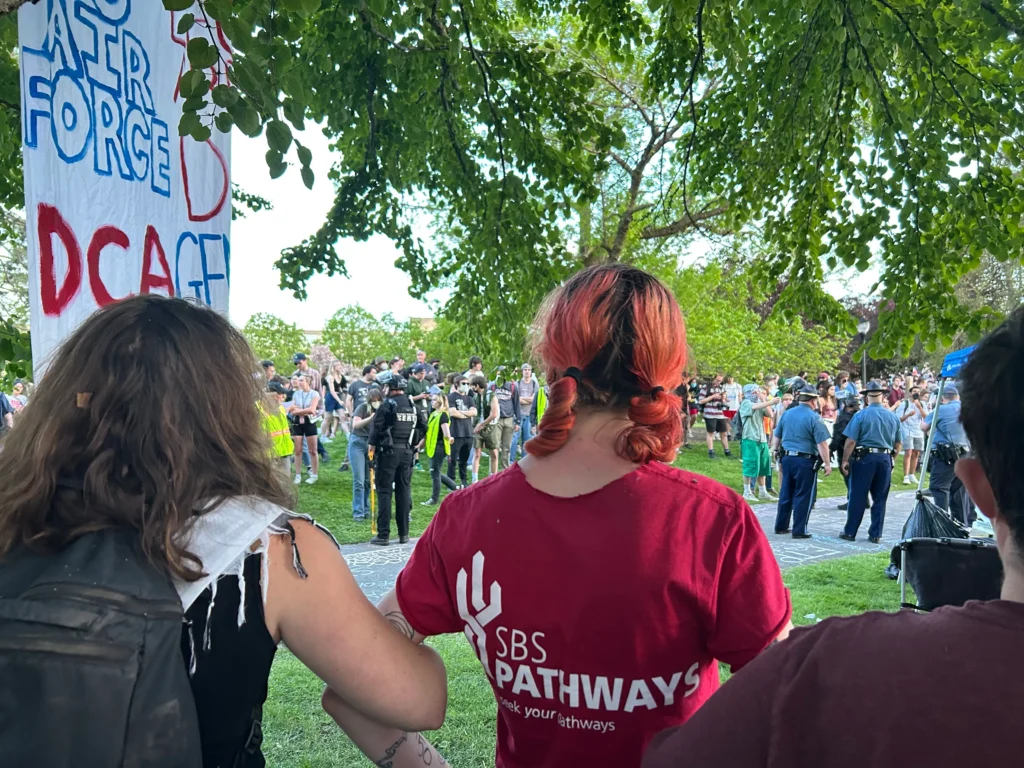UMass Drops Request for Felony Charges Against Palestine Protestors

Student protestors locked arms as police gathered during UMass' crackdown on a Palestine solidarity encampment on May 7. Photo: Story Young
The University’s Change of Course Follows The Shoestring’s Reporting on the Potential Charges and Renewed Pushback from Faculty and Staff
by Dusty Christensen and Brian Zayatz
The following article, “UMass Drops Request for Felony Charges Against Palestine Protestors” was originally published by The Shoestring on August 14, 2024. and is reposted here, with permission, via the Masswire News Service of the Boston Institute for Nonprofit Journalism. Please contact The Shoestring directly for inquiries regarding further republication.
Read more: UMass Seeking Felony Riot Charges Against Palestinian Activists by Dusty Christensen, Story Young, Dan McGlynn and Shelby Lee
Opinion: UMass Chancellor Reyes’ Police Action Was Unnecessary and Unprecedented. A Brief History of Dissent At UMass Amherst by Art Keene (5/17/24)
The University of Massachusetts Amherst Police Department has withdrawn its attempt to charge two pro-Palestine activists on campus with felony riot charges and other offenses.
Last Thursday, The Shoestring reported that university police were seeking “inciting to riot” charges against the two co-presidents of the university’s Students for Justice in Palestine chapter, Rüya Hazeyen and Maysoun Batley, over their involvement in a pro-Palestine encampment on campus on May 7. Police carried out one of the largest Palestine-encampment crackdowns in the country that night, arresting 134 people, though not Hazeyen or Batley. Instead, police sought to bring those felony charges against the two activists after the fact, as well as a charge of assault and battery on a police officer against Batley, alleging that she spit on a police officer.
“I can confirm that, upon further review, UMPD has withdrawn the application for complaint for all charges against these two individuals,” UMass spokesperson Samuel Masinter said in a statement.
The Shoestring’s reporting prompted a statement Monday from the university’s Professional Staff Union condemning the “crackdown on free speech” on campus and accusing Chancellor Javier Reyes’ administration of “trending towards authoritarianism.” The union accused Reyes of a “disregard for UMass’s long tradition of democratic government” in his creation of a new Campus Demonstration Policy Task Force that “deliberately excludes union representation.” That body, the union said, will craft policies impacting workplace safety and free-speech rights of its members.
“We stand firmly for the rights of all students, staff, faculty, and community members to engage in peaceful protest at our public university,” Andrew Gorry, the union’s co-chair, said in a statement. “We celebrate the right to free speech and are committed to defending that right—which ought to be able to be exercised without fear of retribution.”
The university, for its part, has maintained that it called the police on protesters because they had violated the school’s land-use policy by erecting their encampment on campus. UMass officials have said that no one was arrested for protesting but instead for refusing multiple orders to disperse.
The announcement that the university is no longer seeking any charges also came as faculty began rallying supporters to show up at the courthouse on the day of the hearing.
Hazeyen and Batley faced up to two and a half years in jail if they had been convicted of the riot charges. The students were set to have a hearing before the Eastern Hampshire District Court’s clerk magistrate later this week — a process The Boston Globe has likened to a “secret court.” But on Tuesday, the university confirmed to The Shoestring that the hearing has been canceled.
“It is welcome news,” Hazeyen and Batley’s lawyer, Jack Godleski, told The Shoestring. “It’s a shame Maysoun and Ruya had to go through this experience, but it’s better that UMass came around rather than never.”
The Shoestring is committed to bringing you ad-free content. We rely on readers to support our work! You can support independent news for Western Mass by visiting our Donate page. Subscribe to The Shoestring here.

“The students were set to have a hearing before the Eastern Hampshire District Court’s clerk magistrate later this week — a process The Boston Globe has likened to a “secret court.””
Come on folks, facts matter…
In Massachusetts, there are two ways for the police to initiate criminal charges. One is to arrest someone, which they could have done.
The other is — essentially — to write a traffic ticket. To summons the person to appear before the Clerk Magistrate, which is exactly what you have to do to fight a speeding ticket, except that you don’t have to pay the $100. And the Clerk Magistrate either decides there is grounds (“cause”) to send the charge to the DA for prosecution, or there isn’t (and throws it out). Yes, this is a closed proceeding — and that protects the accused because if the charge is dismissed, there is no public record of it. Future employers can’t find mention of it — they *can* if the police instead arrest the person.
I never thought I would be defending the UMPD, but in going the “show cause” route, they are actually doing the decent thing. They instead could have gotten warrants and arrested these two people, who would have then been subjected to a lot more than just having to show up in Belchertown….